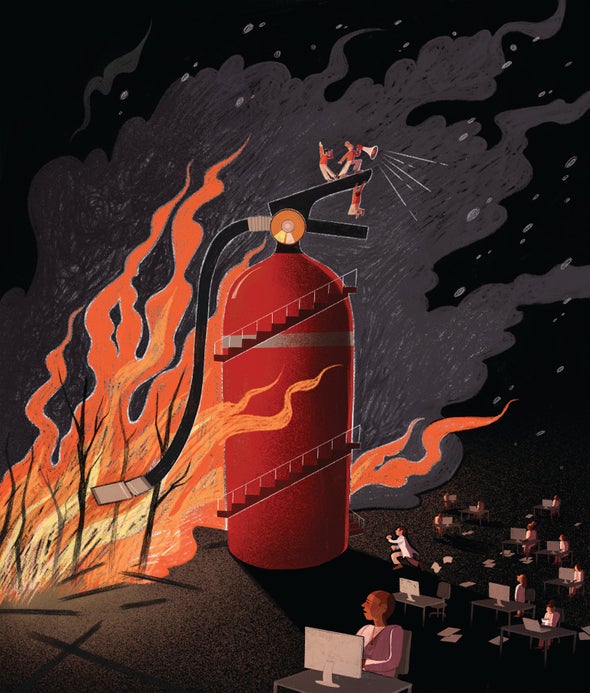In 1988 the Intergovernmental Panel on Climate Change (IPCC) was created as a joint venture between the World Meteorological Organization and the United Nations Environment Program to advise global leaders on the risks of anthropogenic (human-caused) climate change.* In 1992 the charge was made more specific, as the U.N. Framework Convention on Climate Change defined the concept of “dangerous anthropogenic interference” (DAI) with the climate system. Scientists were asked to define the level of climate change that would constitute DAI and evaluate what its consequences might be. This past August one of the IPCC’s three working groups issued its sixth comprehensive report. One media outlet called it “devastating.” Another called it “grim.” Crucially, the report confirmed that the current level of warming—just over one degree Celsius—has crossed the DAI threshold.
The report was released during a catastrophic summer of fires and floods during which ordinary observers could see the effects of climate change unfolding in real time, and this no doubt contributed to a high level of media and public interest. But for those of us who have been following the issue, there was little that was really new. Back in 1995 the IPCC had already concluded that the human effect on the climate system was “discernible.” In 2001 the panel told us that “abrupt and irreversible” changes could occur. By 2007 warming largely attributable to human causes was “unequivocal,” accelerating a measurable loss of mountain glaciers and terrestrial snow cover that was in turn contributing to significant sea-level rise. And there was already strong evidence that warming was exacerbating extreme weather events and that heating and acidification of the oceans were threatening the future of coral reefs and other marine life. The main thing that was new in the latest IPCC report was not so much the science but the tone. In the past, IPCC scientists have bent over backward to be calm and not to overstate the case. But in the latest report, the tone was alarmed. That’s good because when the facts are alarming, it is rational both to be alarmed and to convey that alarm to others.
But this raises a question for the IPCC: What now? The answer is for scientists of Working Group 1 to declare their job done and pass the baton to the rest of the scientists who populate the organization. Many people don’t realize that the IPCC has three working groups. Working Group 1 (WG1), which issued this summer’s statements, addresses the “physical science basis” of climate change. WG2 deals with “impacts, adaptation, and vulnerability,” and WG3 looks at mitigation. Put another way, WG2 explores in detail why climate change matters, and WG3 tries to figure out how to stop it. Now that we know that DAI is fully underway, it’s time to focus on preventing the problem from getting even worse and figuring out how to adapt to the changes we can no longer prevent. One step that could help that happen would be for the IPCC to declare the job of WG1 to be done and close it down.
After all, if human-made warming is as unequivocal as these scientists insist, then why do we need more reports to tell us the same thing? Closing WG1 would answer that question and would allow climate scientists to refocus on basic science, which is, after all, what most of them are trained to do. And it would encourage public and policy attention to shift to solving the problem. This change in focus will require us to pay closer attention to what our economists, sociologists, urban planners and biologists have to say than we have to date, and these experts are mostly to be found in the IPCC’s other two working groups.
Over the past 30 years the physical science that explains the dangers of our interference with the climate system has become ever clearer. Yet our ability to tackle the problem seems to have stood still. When the IPCC first gathered in 1988, the concentration of atmospheric carbon dioxide stood at 352 ppm (parts per million). Today it is 410 ppm and rising. More than half of all emissions have been generated since the IPCC began. Climate change is no longer a question of physical science. So let’s thank the climate scientists who have worked so hard to clarify the problem and look to others who can help us figure out how to solve it.
*Editor’s Note (12/30/21): This sentence was edited after posting to correct the name of the Intergovernmental Panel on Climate Change.


